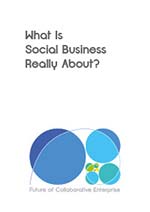 Core HR processes such as competency models or compensation systems are slow to evolve, and the tidal wave of “collaborative everything” have left most of the HR vista bled dry on the performance shore. So, where to go from there to embrace and take an active part in the digital disruption that most organizations are facing today?
Core HR processes such as competency models or compensation systems are slow to evolve, and the tidal wave of “collaborative everything” have left most of the HR vista bled dry on the performance shore. So, where to go from there to embrace and take an active part in the digital disruption that most organizations are facing today?
Answering this question is (or at least should be) on the agenda of every HR executive. For this reason, the HRTech World Congress is certainly one of the most interesting conferences to follow in order to understand how the world of work is evolving. From this point of view, the last edition that took place last October in Paris was both thrilling … and hopeless. That is at least how it appeared to me while assisting the conference with Frédéric Williquet, who shortly will complete these notes on his blog.
The Bad
If this edition would need to have a subtitle, this one would be “helping you to deal with complexity.” But if this promise was the common point between all vendors, they are pushing quite different answers. While the lure of big data, that seemed so appealing last year, had quite disappeared from most discourses and sessions, the number of vendors and startups proposing data-based solutions to streamline or automatize the recruitment process was overwhelming. In an era when diversity, critical thinking and unique competencies are so badly needed, this conveyed a despairing message…
On the pessimistic side, I would also place most of the efforts placed on “well-being” services and applications, which appear to me like putting some lipstick on pigs—to quote the title of Euan Semple’s session—and that I bet will disappear in the false-good-ideas limbo, similar to gamification a couple of years ago. But time will tell.
The Good
But I would be dishonest by saying that I was disappointed by the conference. Many things are saying that HR are moving from an industrial vision of enterprise to a much more flexible, human-centered and social approach. The days of the traditional LMS, for instance, are counted as learning environments are turning into hubs gathering and dispatching all kinds of knowledge and imagining individualized ways to share and enhance it.
Rather than trying to tackle complexity at organizational level, vendors now focus on teams, individuals and interactions. Continuous feedback is more and more replacing the conventional annual survey. More and more, they are taking into account, not only quantitative, but qualitative and subjective data into the way they allow evaluation.
The Emergent
These two trends, the good and the bad, illustrate how much HR executives are today torn between two universes difficult to reconcile: the resources requisites and the human imperatives. But no matter how deep the space between the two terms of this equation might be, it is now filling up with more human-centered analytics and whole approaches.
Capturing subjective data, such as peer recommendations on particular competencies, opens the field for a new kind of HR tools based on the social graph, showing relationships and accountability aside from hierarchy-based certifications. I may dream, but I guess it won’t be long before a manager is able to build teams not only according to objective competencies, but also to cultural fitness based upon network closeness and intimacy.
Another striking emergence is the recognition of design thinking as a structural method to drive innovation and to enable people inside organizations. The devil is in the details, of course, but this is the sign that organizational transformation is under way, and that HR executives now have their roadmap. Time is long overdue for them to take the seat.







Pingback: HR Tech 2017 : Capturing complexity through people interactions made possible. | fredericw